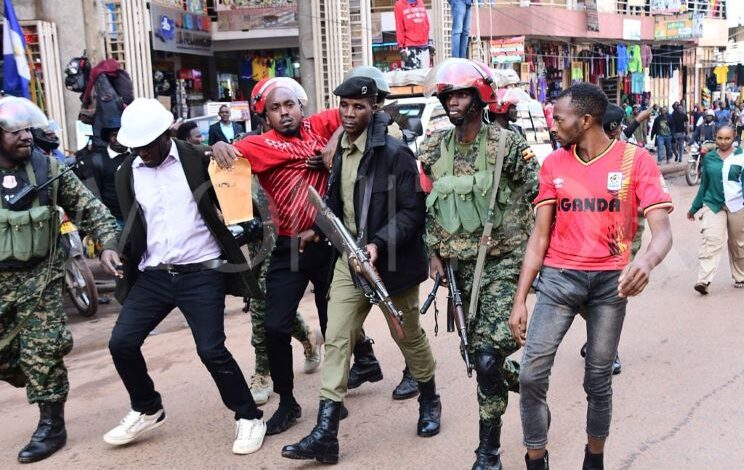Police, Military Merge To Thwart #March2Parliament Protest

Kampala, the capital city of Uganda, was a scene of heightened security presence as the much-anticipated largely National Unity Platform (NUP)-pumped #March2Parliament protest flopped due to a merger of efforts by police and military.
The usually bustling streets were eerily quiet, with major roads and key installations, including the parliament, heavily deployed with security personnel.
The protesters, who had planned to march to parliament to express their discontent with corruption, were met with a formidable force that left no room for dissent. According to Chapter Four, over 45 protestors who approached both alone or in small groups were arrested and detained at various police stations across the city.
While some arrests were made without incident, others were brutally executed by security officers against unarmed protesters who sang #SpeakerMustGo and #AnitaMustResign. Lawyers from different firms, including the Uganda Law Society (ULS) led by its president Benard Oundo, and NUP lawyers Benjamin Katana and George Musisi, spent their day running between police stations, trying to process police bonds, but were met with resistance from police, making it difficult to access their clients.
The Parliament, which resumed from a two-month recess, partially debated the protest, with the Leader of the Opposition Joel Ssenyonyi raising concerns about double standards by the leadership of parliament. The LoP expressed dissatisfaction with the arrest and detention of three MPs who were produced in court and remanded at Luzira maximum prison until Thursday.
Prime Minister Robinah Nabbanja defended the arrests, citing preventative action under Article 3 of the constitution, which mandates the government to protect people’s lives and property. However, Deputy Speaker Thomas Tayebwa suggested that citizens with grievances should notify parliament leadership through proper channels, implying that the protesters were wrongly entertained by security.
As the city returned to a semblance of normalcy, questions lingered about the heavy-handed approach by security forces and the implications for future protests.
The NUP leaders, led by the party president Robert Kyagulanyi Ssentamu known as Bobi Wine, have consistently encouraged young people to rise and demonstrate against the regime.
The party president has been quoted as saying that leaders only account when they are pressed harder, implying that protests and demonstrations are necessary to bring about change.
The LoP has also severally echoed this sentiment, singing the same chorus and urging young people to take action. It is, therefore, no surprise that two NUP party lawyers were part of the wider team of busy rescue teams, trying to secure the release of protesters who had been arrested and detained.
As the situation which people say is targeting parliament which takes “less than 1% of the national budget” continues to unfold, it remains to be seen whether the NUP leaders’ strategy of encouraging protests and demonstrations will lead to meaningful change, or whether it will be met with further repression from the government.
Social media activists expressed concern about the non-participation of chief organizers of the #March2Parliament protest, especially Agather Atuhairwe, Dr. Spire Ssentongo, Culton Scovia Nakamya, Nicolas Opiyo, etc, who instead stuck to social media platforms to inform victims of security brutality about the availability of lawyers to assist them.
